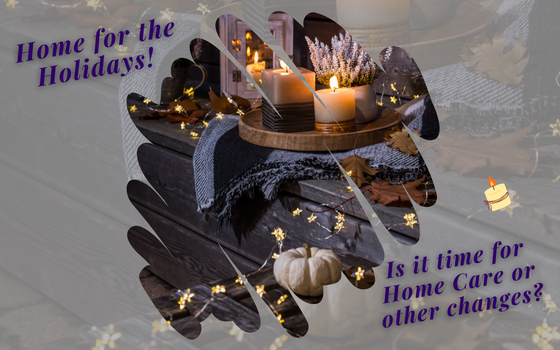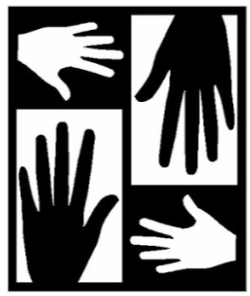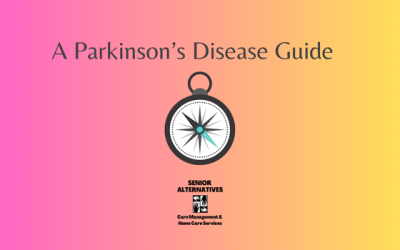November 10, 2022

– The holiday season is upon us, with falling leaves, cooler days, longer nights and its hustle and bustle. It is also the time of year when we give thanks for all of our blessings and for our friends and family. This time marks an opportunity when visiting loved ones to take stock of what is happening in their lives. In many cases, older adults are determined to conceal or downplay any age related decline or issues that happen quickly. This can mean new or worsening problems that seniors may be having. For many families, holiday visits are the only opportunity they get all year to see aging loved ones in person, so it’s important to pay close attention to physical and mental health and their living situation. For this reason, visits during the holidays can reveal a great deal about our aging loved ones. Here are some of the signs to look for in order to know if it is time for home care or other changes.
Signs of Age-Related Decline to Look for During Holiday Visits
-
Weight Loss
One of the most obvious signs of ill health is weight loss. Possible causes could include cancer, dementia or depression. Seniors may experience lower energy levels or fatigue, which can make it challenging to shop for and prepare nutritious meals and then clean up afterwards. Furthermore, an elder may consider all this effort unnecessary, especially if they live and eat alone. Certain medications and aging in general can also cause a reduction in appetite and change the way food tastes. If weight loss is evident, encourage your loved one to schedule a doctor’s appointment to address the issue. When I noticed changes in my mom’s physical appearance, I made sure these concerns were addressed by her primary care doctor before my visit ended.
-
Changes in Balance and Mobility
Pay close attention to the way your loved one moves and how they walk. A reluctance to walk, changes in gait or obvious pain during movement can be a sign of joint, muscle or neurological problems. If your loved one is unsteady on their feet, they may be at risk of falling. According to the Centers for Disease Control and Prevention (CDC), an estimated three million people are treated at emergency departments each year for fall-related injuries like hip fractures. If you notice changes in a senior’s mobility and coordination, make an appointment with their doctor to discuss options for keeping them safe and mobile, such as pain management, physical therapy, in-home care and mobility aids. If limited mobility is not addressed, fear of falling can cause seniors to withdraw and stop participating in daily activities both inside and outside the home. Be forewarned that minimized activity can actually cause elders to become frailer and even more susceptible to falls.
-
Fluctuations in Mood and Behavior
Keep an eye out for changes in your loved one’s moods, behavior and routines. You can’t always gauge someone’s emotional state over the telephone, even if you speak daily. To determine whether a loved one is staying active and getting valuable social interaction, it helps to have a general idea of what their usual schedule is like and the kinds of pastimes they enjoy. Are they still going to church on Sundays or seeing the hairdresser on Fridays? Do they still take a nightly stroll around the block or enjoy sitting down with a good book in the afternoon? When I visited my mom, I took notice of whether she was still engaged in her normal routines, such as grocery shopping, preparing meals, basic housekeeping and reading the newspaper.
Look for signs of depression and anxiety, including withdrawal from social activities, changes in sleep patterns, loss of interest in hobbies, and changes in basic home maintenance and personal hygiene. The latter can be an indicator of cognitive decline or other physical ailments like dehydration, which often happens to elders in the winter months and can be serious.
If I noticed any sudden odd behavior, such as agitation or confusion, I quickly made an appointment with my mother’s doctor for a urine test to see if she had a urinary tract infection (UTI). UTIs are common in elders and, while they are easily resolved with antibiotics, they cause serious symptoms that can mimic or exacerbate dementia-related behaviors. -
Changes in the Home Environment
Attention must also be paid to a senior’s surroundings. For instance, if your loved one has always been a stickler for tidiness and paying bills promptly, but you discover excess clutter and stacks of unopened mail while visiting, it signals a problem. Take a walkthrough of their home during your visit to see if they are keeping the house to their usual standards. Be aware that sometimes the signs of trouble are a bit subtler. Scorched cookware could indicate that your loved one has forgotten food on the stove or in the oven. An overflowing hamper could mean they don’t have the strength and/or desire to do laundry. These signs might indicate it’s time to arrange for someone else to take over meal preparation and laundry duties.
Additionally, check the expiration dates on their prescriptions and over-the-counter medications and try to determine if they’re taking them as prescribed. Like many elders, my mother did not like taking her pills. This was very obvious because she had unused and expired prescription bottles strewn throughout the house. This was one of the first areas that I stepped in to help with. During visits, I’d work with her to organize and purge her medications, and eventually I asked a neighbor to stop by regularly to ensure the system I had put in place was working.
As Mom declined further, it became clear that she needed someone present to help her with medication management, so I hired a professional caregiver. I also scheduled a doctor’s appointment each time I was in town to have Mom’s full regimen evaluated and updated (often called a “brown bag checkup”).
Keep in mind that many seniors tend to put extra effort into their personal care and their home just before visitors arrive to keep up appearances. However, just because there are no obvious warning signs doesn’t necessarily mean that nothing is amiss. You know your loved one and their habits best, so go with your gut if something seems off.
How to Handle Signs of Decline
The issues explained above are the four most common categories of age-related decline that long-distance caregivers experience during visits with their loved ones, but there are others to look out for. Senior Alternatives provides a free 45 minute consultation and can help you identify these changes.
While you may want to keep things light during the holiday season, do take this opportunity to address any red flags that you observe. Collect any necessary information while you are in town to avoid added frustration and confusion in the event of a crisis down the road.
The Initial Conversation
First, have a heart-to-heart conversation with your loved one about their present circumstances and both of your concerns. Suggest making an appointment with their primary care physician for a complete health assessment. The results of this evaluation will help you work together to determine what next steps are necessary.
One of the first places people often start is with care at home. This provides the most independence for your loved one while still getting the help they need. This can also give you peace of mind that someone is at home with your loved one to help identify areas of help they need. Senior Alternatives takes calls 24/7 and can start getting you the help you need immediately.
Sit down with your loved one to create a list of local people they interact with on a regular basis. This list should include other family members, friends, neighbors and clergy whom you can trust to keep an eye on your loved one in your absence and contact in the event of an emergency. Double check their home addresses, telephone numbers and email addresses, and be sure to share your own contact information with them.
If your loved one needs help with household chores, laundry and/or bathing, ask them how they would feel about having a home health aide visit a couple times a week. I was able to convince my mother to accept this help by reminding her that additional support would keep her healthy and safe, thereby allowing her to continue living in her own home longer.
Make an Elder Care To-Do List
If you realize that your loved one is showing signs of needing help at home, now is the time to begin compiling a to-do list to be implemented over a period of future visits. This list consists of three main categories: medical, legal and financial.
You’ll want to develop a complete medical record for your loved one, including their health conditions, current prescriptions, and doctors’ names and contact information. This is extremely helpful for you to have on file, and your loved one can keep a condensed copy on hand for both routine appointments and medical emergencies.
A financial list should contain information pertaining to all a loved one’s property, debts, income, expenses, bank accounts and credit cards. Should you need to assume control of their finances over the short or long term, this list will help minimize confusion and ensure all their bills are paid on time.
The legal aspect of this to-do list is the most important. There are vital documents that must be obtained to ensure you can access your loved one’s medical information, make me
#seniorhelpers #athomecare #homecareproviders #elderlyassistance #seniorhomecare #caregiver #elderlycare #elderlyservices #homecareservices #careagency #careagency #seniorassistance #servicesforseniors #careathome #inhomecare #careinhomes #careservices #elderlycaregiver #memorycare #homecare #seniorcare
For a free 45 minute consultation, reach out to us at: 888.451.4290 – We are here to help during the holidays and all year long.
Related Articles
Why People in Blue Zones Thrive and Live Longer
Blue Zones are regions where people live longer, healthier lives compared to the global average. These areas have been studied extensively to find common denominators and answers about what makes these places unique. One of the key components of these lifestyles is community engagement, or having a strong sense of belonging and support from others. Read on to know more about Blue Zones and how we can duplicate their lifestyle and best practices.
Understanding Parkinson’s Disease
April is Parkinson’s disease awareness month, with that in mind we put together a blog
A guide to effectively enhance, remodel or retrofit homes and environments for older adults.
This week, we created a guide on how to accommodate a home or environment for older adults, especially people with memory loss which can be vital for their comfort and well-being. Whether the memory loss stems from conditions like Alzheimer’s or short-term impairments, retrofitting a home can significantly enhance safety, accessibility, and overall quality of life.





